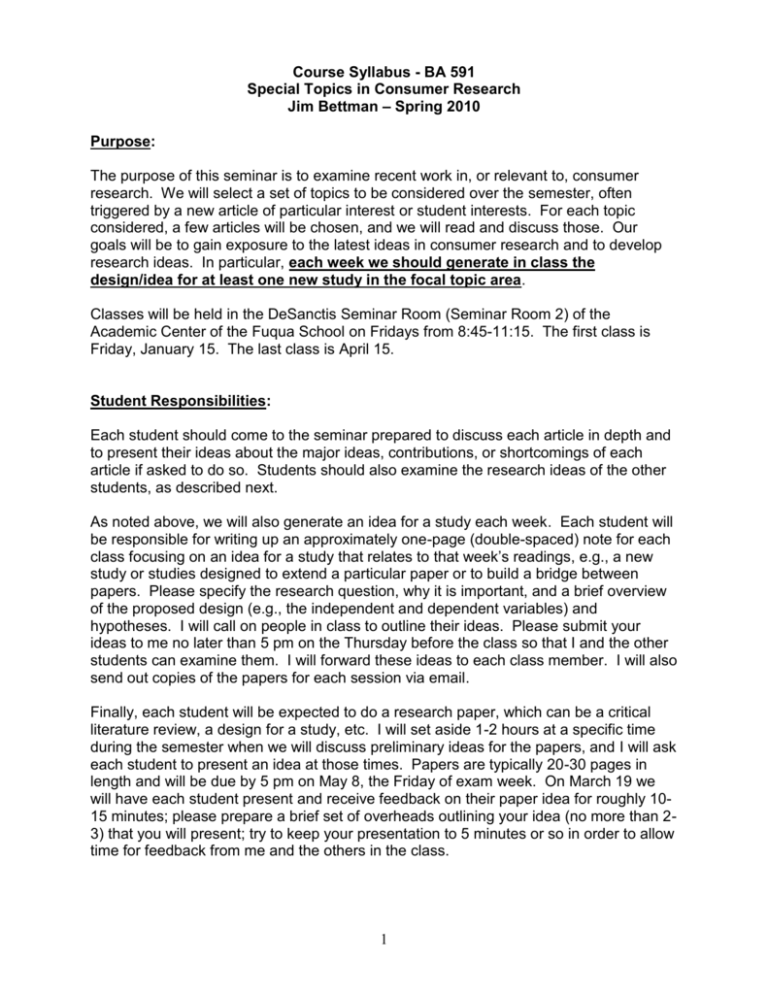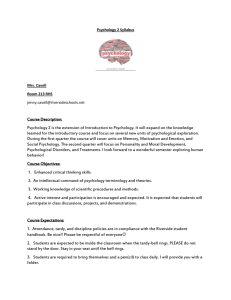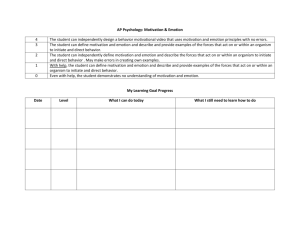BA591 Course Syllabus, Spring 2010
advertisement

Course Syllabus - BA 591 Special Topics in Consumer Research Jim Bettman – Spring 2010 Purpose: The purpose of this seminar is to examine recent work in, or relevant to, consumer research. We will select a set of topics to be considered over the semester, often triggered by a new article of particular interest or student interests. For each topic considered, a few articles will be chosen, and we will read and discuss those. Our goals will be to gain exposure to the latest ideas in consumer research and to develop research ideas. In particular, each week we should generate in class the design/idea for at least one new study in the focal topic area. Classes will be held in the DeSanctis Seminar Room (Seminar Room 2) of the Academic Center of the Fuqua School on Fridays from 8:45-11:15. The first class is Friday, January 15. The last class is April 15. Student Responsibilities: Each student should come to the seminar prepared to discuss each article in depth and to present their ideas about the major ideas, contributions, or shortcomings of each article if asked to do so. Students should also examine the research ideas of the other students, as described next. As noted above, we will also generate an idea for a study each week. Each student will be responsible for writing up an approximately one-page (double-spaced) note for each class focusing on an idea for a study that relates to that week’s readings, e.g., a new study or studies designed to extend a particular paper or to build a bridge between papers. Please specify the research question, why it is important, and a brief overview of the proposed design (e.g., the independent and dependent variables) and hypotheses. I will call on people in class to outline their ideas. Please submit your ideas to me no later than 5 pm on the Thursday before the class so that I and the other students can examine them. I will forward these ideas to each class member. I will also send out copies of the papers for each session via email. Finally, each student will be expected to do a research paper, which can be a critical literature review, a design for a study, etc. I will set aside 1-2 hours at a specific time during the semester when we will discuss preliminary ideas for the papers, and I will ask each student to present an idea at those times. Papers are typically 20-30 pages in length and will be due by 5 pm on May 8, the Friday of exam week. On March 19 we will have each student present and receive feedback on their paper idea for roughly 1015 minutes; please prepare a brief set of overheads outlining your idea (no more than 23) that you will present; try to keep your presentation to 5 minutes or so in order to allow time for feedback from me and the others in the class. 1 Papers for BA591, Spring 2010 Session 1 – Utility and Emotion Regulation – January 15, 2010 a. Tamir, Maya (2009), “What Do People Want to Feel and Why? Pleasure and Utility in Emotion Regulation,” Current Directions in Psychological Science, 18 (April), 101-105. b. Tamir, Maya, Christopher Mitchell, and James J. Gross (2008), “Hedonic and Instrumental Motives in Anger Regulation,” Psychological Science, 19 (April), 324-328. c. Andrade, Eduardo B. and Teck-Hua Ho (2009), “Gaming Emotions in Social Interactions,” Journal of Consumer Research, 36 (December), 539-552. Session 2 – Perceptions of Time and Distance – January 22, 2010 a. Zauberman, Gal, Jonathan Levav, Kristin Diehl, and Rajesh Bhargave (2010), “1995 Feels So Close Yet So Far: The Effect of Event Markers on Subjective Feelings of Elapsed Time,” Psychological Science, 21 (January), 133-139. b. Balcetis, Emily and David Dunning (2010), “Wishful Seeing: More Desired Objects Are Seen as Closer,” Psychological Science, 21 (January), 147-152. c. Sackett, Aaron M., Tom Meyvis, Leif D. Nelson, Benjamin A. Converse, and Anna L. Sackett (2010), “You’re Having Fun When Time Flies: The Hedonic Consequences of Subjective Time Progression,” Psychological Science, 21 (January), 111-117. Session 3 – Emotion and Prosocial Behavior – January 29, 2010 a. Small, Deborah A. and Nichole M. Verrochi (2009), “The Face of Need: Facial Emotion Expression on Charity Advertisements,” Journal of Marketing Research, 46 (December), 777-787. b. Cavanaugh, Lisa A., James R. Bettman, and Mary Frances Luce (2009), “Feeling Good and Doing Better: How Specific Positive Emotions Differentially Influence Prosocial Consumption,” working paper. c. Oveis, Christopher, E. J. Horberg, and Dacher Keltner (2010), “Compassion, Pride, and Social Intuitions of Self-Other Similarity,” Journal of Personality and Social Psychology. Session 4 – Effects of Sensory Cues – February 5, 2010 a. Krishna, Aradhna, May O. Lwin, and Maureen Morrin (2010), “Product Scent and Memory,” Journal of Consumer Research, 37 (June). b. Krishna, Aradhna and Maureen Morrin (2008), “Does Touch Affect Taste? The Perceptual Transfer of Product Container Haptic Cues,” Journal of Consumer Research, 34 (April), 807-818. c. Peck, Joann and Suzanne B. Shu (2009), “The Effect of Mere Touch on Perceived Ownership,” Journal of Consumer Research, 36 (October), 434-447, Session 5 – Popularity – February 12, 2010 a. Berger, Jonah and Gaël Le Mens (2009), “How Adoption Speed Affects the 2 Abandonment of Cultural Tastes,” Proceedings of the National Academy of Sciences, 106 (May 19, 2009), 8146-8150. b. Heath, Chip, Chris Bell, and Emily Sternberg (2001), “Emotional Selection in Memes: The Case of Urban Legends,” Journal of Personality and Social Psychology, 81 (December), 1028-1041. c. Berger, Jonah, Alan T. Sorensen, and Scott J. Rasmussen (forthcoming), “Positive Effects of Negative Publicity: When Negative Reviews Increase Sales,” Marketing Science. Session 6 – Stigma and Bad Behavior – February 19, 2010 a. Sandikci, Özlem and Güliz Ger (2010), “Veiling in Style: How Does a Stigmatized Practice Become Fashionable,” Journal of Consumer Research, 37 (June). b. Luedicke, Marius K., Craig J. Thompson, and Markus Giesler (2010), “Consumer Identity Work as Moral Pragmatism: How Myth and Ideology Animate a BrandMediated Moral Conflict,” Journal of Consumer Research, 36 (April). c. Horberg, E. J., Christopher Oveis, Dacher Keltner, and Adam B. Cohen (2009), “Disgust and the Moralization of Purity,” Journal of Personality and Social Psychology, 97 (December), 963-976. Session 7 – Experiences I – February 26, 2010 a. Goode, Miranda R., Darren W. Dahl, and C. Page Moreau (2010), “The Effect of Experiential Analogies on Consumer Perceptions and Attitudes,” Journal of Marketing Research, 47 (April). b. Biswas, Dipayan, Dhruv Grewal, and Anne Roggeveen (forthcoming), “How the Order of Sampled Experiential Products Affects Choice,” Journal of Marketing Research. c. Shu, Suzanne B. and Ayelet Gneezy (forthcoming), “Procrastination of Enjoyable Experiences,” Journal of Marketing Research. Session 8 – Health – March 5, 2010 a. Samper, Adriana, Devavrat Purohit, and Mary Frances Luce (2010), “Contagion, Control and Prevention: Perceptions of Control and Message Fit,” working paper. b. Pechmann, Cornelia and Liangyan Wang (2010), “Effects of Indirectly and Directly Competing Reference Group Messages and Persuasion Knowledge: Implications for Educational Placements,” Journal of Marketing Research, 47 (February), 134145. c. Agrawal, Nidhi and Adam Duhachek (2010), “Emotional Compatibility and the Effectiveness of Anti-Drinking Messages: A Defensive Processing Perspective on Shame and Guilt,” Journal of Marketing Research, 47 (April). Session 9 – Student Paper Idea Presentations – March 19, 2010 Session 10 – Embodiment – March 26, 2010 a. Niedenthal, Paula (2007), “Embodying Emotion,” Science, 316 (May 18), 1002-1005. b. Jostmann, Nils B., Daniël Lakens, and Thomas W. Schubert (2009), “Weight as an Embodiment of Importance,” Psychological Science, 20 (September), 1169-1174. 3 c. Miles, Lynden K., Louise K. Nind, and C. Neil Macrae (2010), “Moving Through Time,” Psychological Science, 21. d. Liljenquist, Katie, Chen-Bo Zhong, and Adam D. Galinsky (2010), “The Smell of Virtue: Clean Scents Promote Reciprocity and Charity,” Psychological Science, 21. e. Mortensen, Chad R., D. Vaughn Becker, Joshua M. Ackerman, Steven L. Neuberg, and Douglas T. Kenrick (2010), “Infection Breeds Reticence: The Effects of Disease Salience on Self-Perceptions of Personality and Behavioral Avoidance Tendencies,” Psychological Science, 21. Session 11 – Emotion, Persuasion, and Evaluation – April 2, 2010 a. Lau-Gesk, Lorraine and Joan Meyers-Levy (2009), “Emotional Persuasion: When the Valence versus the Resource Demands of Emotions Influence Consumers’ Attitudes,” Journal of Consumer Research, 36 (December), 585-599. b. Lee, Seungjo and Annie Lang (2009), “Discrete Emotion and Motivation: Relative Activation in the Appetitive and Aversive Motivational Systems as a Function of Anger, Sadness, Fear, and Joy During Televised Information Campaigns,” Media Psychology, 12 (2), 148-170. c. Kim, Hakkyun, Kiwan Park, and Norbert Schwarz (2010), “Will This Trip Really Be Exciting? The Role of Incidental Emotions in Product Evaluation,” Journal of Consumer Research, 36 (April). Session 12 – Experiences 2 – April 9, 2010 a. Van Boven, Leaf, Margaret C. Campbell, and Thomas Gilovich (In press), “Stigmatizing Materialism: On Stereotypes and Impressions of Materialistic and Experiential Pursuits,” Personality and Social Psychology Bulletin. b. Carter, Travis J. and Thomas Gilovich (2010), “The Relative Relativity of Material and Experiential Purchases,” Journal of Personality and Social Psychology, 98 (January), 146-159. c. Carter, Travis J. and Thomas Gilovich (2010), “I Am What I Do, Not What I Have: The Centrality of Experiential Purchases to the Self-Concept,” working paper. Session 13 – Customized Session – April 16, 2010 a. Moreau, C. Page and Kelley B. Herd (2010), “To Each His Own? How Comparisons with Others Influence Consumers’ Evaluations of Their Self-Designed Products,” Journal of Consumer Research, 36 (February), 806-819. b. Kruger, Justin, Nicholas Epley, Jason Parker, and Zhi-Wen Ng (2005), “Egocentrism Over E-Mail: Can We Communicate as Well as We Think,” Journal of Personality and Social Psychology,” 89 (December), 925-936. c. Greitemeyer, Tobias and Silvia Osswald (2010), “Effects of Prosocial Video Games on Prosocial Behavior,” Journal of Personality and Social Psychology, 98 (February), 211-221. 4








